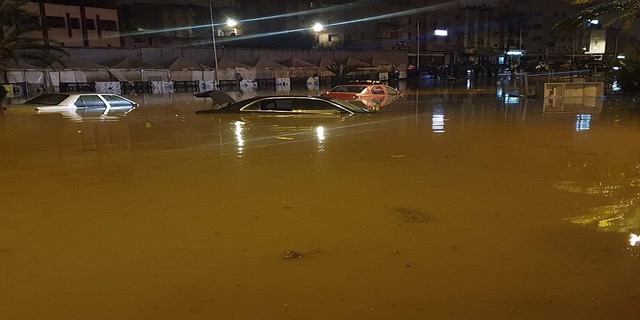Judy writes*
The new year held an awful surprise for many Casablancans: overflowing sewage flooded the streets for several days after heavy rains in the first days of January.
Heavy rains are not a new phenomenon in this city, yet climate change is likely to increase their intensity and frequency and growing urbanization challenges current water systems. The water damage is high and the performance of sewage infrastructure low, citizens are rightfully upset – the question is who should they aim their anger at?
Casablanca’s water systems are managed by the private company Lydec on behalf of the City Council. This delegation and its oversight are formalized in a delegation contract. According to this contract, Lydec alone is in charge of sewage management, and most residents are happy to join in blaming Lydec for the failure.

The City Council shared this opinion and hence summoned Lydec to an emergency meeting only a few days after Lydec’s specialized workers and engineers swarmed the city to help people and clean up the disaster.
However, Lydec’s CEO Darriet responded to the ubiquitous cross-fire by claiming that the utility company did not receive sufficient funding to improve the water infrastructure over the last decade, which is additionally strained by boosting population growth. He referred to a flooding disaster prevention plan to strengthen sewage infrastructure, which the company had previously conceived together with the City Council.
Concretely, they had agreed on a joint investment of 17bn Dirham (€1.5bn). Lydec has come up for its due share of 5bn (€0.46bn), but the City Council has fallen short of investing the other 12bn (€1.1bn) so far. Lydec also pointed out that since it became Casablanca’s utility provider in 1997, the company has made cumulative investments of 26bn Dirham (€2.4bn), almost half of which went into sewage infrastructure.
Further, the regulatory responsibility lies with the City Council, which thus needs to question its own role in the disaster, concerning sloppy oversight and especially chronic underfunding. Indeed, said delegation contract seems to be in dire need of an update, filling gaps and using clearer language when it comes to determining responsibilities. A contract revision has been in planning since 2016, yet without success so far.
After the emergency meeting with Lydec, the City Council set up a special committee tasked to follow up and evaluate the causes of the recent sewage system failure, and renewed its pledge to revise the delegation contract.
Lydec at its part, is trying to restore its damaged image and ease the concerned public by pointing at several current and new sewage restauration projects, partially aided with government money, to be completed before end of this year still.
What shall we make of this situation? It that neither of the actors are without fault. There appears to be a serious problem with transparency around this delegation contract (it is hardly accessible at full length for the public), which is not helpful to resolve the responsibility dilemma, let alone to delivering the residents of Casablanca their due functional, future-proof water and sewage system.
We cannot tell yet what the investigative commission will conclude, whether Lydec’s advertised infrastructure projects are really going to be finished by the end of the year, whether the contract will actually be reformed and if so, how, or how much the City Council will invest in infrastructure in the coming period.
What we do know is that effluent management is by far not the only problem Casablanca has to deal with: drinking water provision is high on the (financial) agenda, so high that the government started to construct a 10bn (€0.92bn) desalination plant just to provide for its ‘economic capital’.
The municipality’s priorities are visible in public money flows, and understandably, providing freshwater may be most important. However, instead of spending millions on desalination, the city might rather invest in wastewater recycling, killing two birds with one stone: improving sewage infrastructure and procuring drinking water at the same time.
Bottom Line: Watch what happens as Casablanca addresses scarcity. Citizens should demand a functional, efficient water system. Outsiders can learn from this case.
* Please help my Water Scarcity students by commenting on unclear analysis, alternative perspectives, better data sources, or maybe just saying something nice 🙂
Wow! This is pretty unbelievable! When you talk about a bad new years, this has got to be it. I found this so interesting to read, as it became pretty clear that locals lay the blame solely on Lydec, and your blog post has made it clear that there are more actors responsible for the problems in Casablanca. It is clear that regulators have to carefully over see water utility companies if water management and supply is to be efficient, so it was interesting learning how the public tend to blame the water utility companies and forget about regulators (the city council). Hopefully this problem can be resolved quickly, but this is looking ever so unlikely. I will definitely be keeping an eye on this, to see how it unfolds in the future.